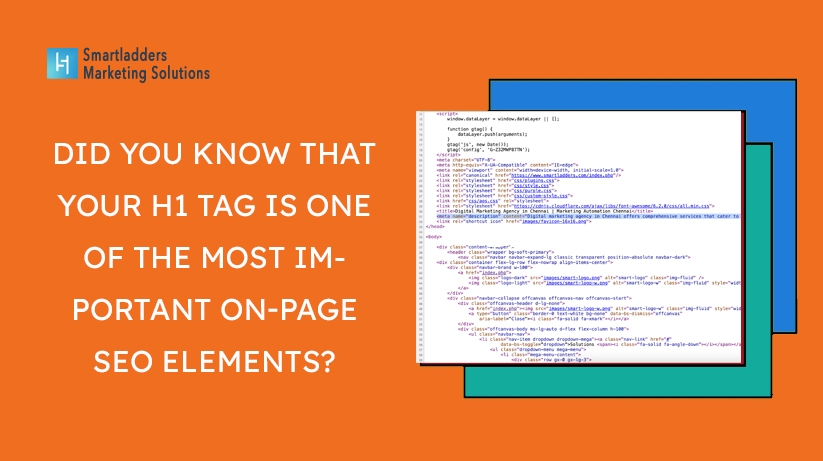
Unlocking the Power of H1 Tags: How Including Keywords in Your H1 Tag Can Boost Your SEO

The Importance of Including Keywords in H1 Tags for SEO: This topic could explore why using keywords in H1 tags is essential for ranking well and provide tips for optimising H1 tags for better SEO performance.
Best Practices for Using Keywords in H1 Tags: This blog post could offer specific guidance on choosing and using keywords effectively in H1 tags, including advice on avoiding keyword stuffing and striking the right balance between optimisation and readability.
How H1 Tags Affect User Experience: Besides their impact on SEO, H1 tags can also impact how users interact with a website. This topic could explore the role of H1 tags in user experience (UX) design and offer insights into how to use H1 tags to improve the overall user experience.
H1 Tags vs Meta Titles: While H1 tags and meta titles are essential for SEO, they serve slightly different purposes. This blog post could explore the similarities and differences between H1 tags and meta titles and provide advice on using both effectively to improve your website's search visibility.
Common Mistakes to Avoid in H1 Tags: As with any SEO tactic, there are potential pitfalls to avoid when using keywords in H1 tags. This topic could highlight some common mistakes to watch out for and offer tips for getting the most out of your H1 tags without risking penalties or negative user experiences.
Let us discuss briefly the above topics:
The Importance of Including Keywords in H1 Tags for SEO:
H1 tags are one of the most important on-page SEO elements that search engines use to understand the content of a web page. H1 tags indicate the heading of a page and provide context to search engines about what the page is about.
Including keywords in H1 tags can help search engines understand the topic one is searching for. A search engine crawls a web page to look for the H1 tag to understand the page's main topic. A keyword in the H1 tag sends a solid signal to the search engine that the page is relevant to that particular keyword.
However, it's important to note that more than including a keyword in the H1 tag alone is needed to rank well in search results. That said, using keywords in H1 tags is a paramount step towards optimising a web page for search engines and should be part of any SEO strategy.
We must also use H1 tags correctly and avoid keyword stuffing. The H1 tag should be in-line with the main heading of the page. Keyword stuffing, or adding too many keywords in the H1 tag, can harm the user experience and result in penalties from search engines.
In summary, including keywords in H1 tags is a crucial aspect of on-page SEO that can rank your topic higher in relevant search results.
Best Practices for Using Keywords in H1 Tags
When it comes to using keywords in H1 tags, there are some practices you should follow to make sure you're optimising your content effectively without compromising the user experience. Here are a few tips:
Choose your keywords wisely: Don't use any keyword in your H1 tag. Make sure it's a keyword or phrase that accurately reflects the main topic of your content and aligns with your overall SEO strategy.
Keep it simple and concise: Your H1 tag should be easy to read and understand. Use fewer words or complex phrases, as this can confuse both search engines and human readers.
Use one H1 tag per page: Each page on your website should have one and only one H1 tag. It helps search engines understand your webpage and ensure your content is structured correctly.
Use various keywords you intend to target: Instead of using the same keyword in every H1 tag on your website, try using variations of your target keyword or related keywords to create more diverse and natural-sounding content.
Ensure your H1 tag matches your content: Your H1 tag should accurately talk about the content on the page.
By following these practices, you can effectively use keywords in your H1 tags to optimise your content for search engines for your website visitors.
How H1 Tags Affect User Experience:
H1 tags, which are HTML tags used to indicate the main heading of a webpage, play a pivotal role in shaping the website. When used effectively, H1 tags can help users quickly understand the purpose and content of a page, making it easier for them to find what they're looking for and navigate the site more efficiently.
Remember, if a user lands on a webpage and sees a clear and concise H1 tag that describes the page's content well, they are likelier to stay on the site and engage with it. Conversely, if the H1 tag needs to be more specific, precise, or overly promotional, users may quickly become frustrated and bounce away from the site.
In addition to helping users find what they're looking for, H1 tags can also help establish the visual hierarchy of a webpage. By making the H1 tag larger and more prominent than other headings or subheadings on the page, designers can create a clear visual order that guides users through the content logically and intuitively.
By using clear, concise, and accurate H1 tags, designers can help users quickly understand the content and purpose of a webpage, improving engagement and overall satisfaction with the site.
H1 Tags vs Meta Titles:
H1 tags and meta titles are crucial for optimising on-page search engines (SEO). Both of these elements serve a similar purpose: to provide information to search engines and users about the content on a web page. However, they serve slightly different purposes and have their unique characteristics.
The H1 tag is a type of HTML tag that designates the main heading of a page. It is a larger font with more prominent formatting than other text on the page.
On the other hand, the meta title is a separate piece of HTML code that appears in the header section of a web page. It is not visible to users on the page but appears in the browser's title bar and search engine results. The meta title should describe the content and include related keywords to make your site more accessible and practical.
While H1 tags and meta titles are critical for SEO, they have slightly different roles. H1 tags signal the main topic of a page, while meta titles provide a concise summary of the content and attract users to click through to the page.
Make sure your H1 tag matches your content.
A relevant and descriptive H1 tag can help with SEO and improve the user experience by giving visitors a clear idea of what they can expect to find on your page.
Your primary purpose is to ensure the H1 tag matches your content; you should first identify the primary topic of your page. It could be a broad subject area, a specific keyword phrase, or a unique value proposition. Once you've determined your primary topic, you can craft a concise and compelling H1 tag that reflects that topic.
It's important to note that your H1 tag should not be a copy-and-paste of your page's title tag or meta description. While these elements can be related, they serve different purposes, and you should aim to create unique and complementary content for each one.
In addition to using your H1 tag to reflect your page's content accurately, you should also aim to make it visually appealing and easy to read. Choose a font, size, and colour that is legible and consistent with your site's overall design.
Ensuring your H1 tag matches your content is essential for SEO and user experience. By crafting a relevant, unique, and visually appealing H1 tag, you can improve your website's search visibility by focusing on the primary theme of the page.
Search Engine Optimization
08 Nov 2023 | RachelRelated Post
The Next Big Thing in SEO
24 May 2023Latest Post

.png)





